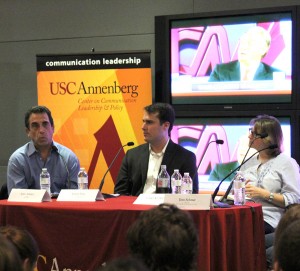First debate draws large USC audience
More students than ever turned out to view the first debate of the 2012 presidential campaign and listen to the subsequent panel at the Annenberg School for Communication and Journalism on Wednesday night, according to Dan Schnur, director of the Jesse M. Unruh Institute of Politics.

Analysis · Alan Arkatov (left), Aaron Taxy and Lindsey Kozberg discuss the pros and cons of each candidate’s performance at an event following Wednesday’s presidential debate. – Ricardo Galvez | Daily Trojan
The debate was held at the University of Denver and moderated by former PBS news anchor Jim Lehrer. Both President Barack Obama and former Massachusetts Gov. Mitt Romney were eager to not only communicate their platforms, but to differentiate themselves. One of the central topics on which the candidates took different approaches was economic recovery.
Romney argued that, given the sluggish economic recovery, the middle class is worse off than it was four years ago.
“The people who are having the hard time right now are middle-income Americans,” Romney said. “Under the president’s policies, middle-income Americans have been buried. They’re just being crushed. Middle-income Americans have seen their income come down by $4,300. This is a tax in and of itself. I’ll call it the economy tax. It’s been crushing.”
Obama, however, argued that his policies — specifically a tax cut — have benefited the middle class.
“I believe that we do best when the middle class is doing well,” Obama said in response to Romney. “And by giving them those tax cuts, they had a little more money in their pocket, and so maybe they can buy a new car. They are certainly in a better position to weather the extraordinary recession that we went through.”
According to a CNN/ORC International poll conducted after the debate, 67 percent of registered voters who watched the contest said Romney won and 25 percent said Obama won.
The panelists, however, were not so clearly swayed after the event.
“At the end of the day, the president did well. He was cool, he was the president, he responded well,” said Alan Arkatov, senior adviser to the manager of the 1992 Bill Clinton for President Campaign. “Romney has to be on the defensive now. Romney has had so many missteps in the past few months — if Obama had had half of those, he’d be behind.”
[Correction: A previous version of this story stated that Mickey Kantor was the senior adviser to the manager of the 1992 Bill Clinton for President Campaign; it also attributed part of the above quote to Kantor. Kantor was the manager of the 1992 Bill Clinton for President Campaign, and he was not present at the panel. The Daily Trojan regrets the error, and the quotation has been amended.]
Charles Epting, the public relations director for the USC College Republicans, said he believed Romney displayed a better debate performance.
“I think tonight, the more composed of the two was Mitt Romney,” Epting said. “I think that the Obama we saw four years ago is gone, and I think that Romney has filled that spot.”
Arkatov asked those in attendance at the panel to raise their hands if they thought Obama won, Romney won or if there was no clear winner. A slight majority of students appeared to raise their hands for Romney, but a larger number raised their hands when asked if they thought there was no clear winner of the debate.
“I think that the most important element of the debate tonight was how many mutual hands came up,” said Aaron Taxy, president of USC College Democrats. “[Obama] just kept it to the basic talking points because he knew that he’s ahead in the polls. I think he played it safe because he knows that on Nov. 6, he’ll come ahead in the polls.”
Though panelists and viewers might have had differing opinions on who won the debate, most agreed that they did not think that many undecided voters would be convinced to vote for either of the candidates.
“At the end of the day, there will be people who won’t be swayed,” said Lindsey Kozberg, vice president of external affairs at RAND Corporation and former special assistant to President George W. Bush in 2003. “I don’t really think there are a lot of people who are choosing at the moment between these two guys. I think there are a lot of undecideds who are choosing whether or not to vote at all.”
All agreed that the undecided voters are the most important demographic for the candidates to win over in the upcoming debates.
“I think that the debates collectively will be really important when it comes to early voting,” Kozberg said, referring to the fact that voting has begun in some states. “I think that overall the debates will have a really big impact.”
Part of this impact could come from young voters. Schnur, who moderated the panel, said the large turnout at the event disproves claims that younger voters are not interested in the election.
“You’ve probably read and you’ve probably heard from any number of media sources that young Americans are nowhere near as interested in the presidential elections as they were in 2008 — as you can see by the turnout here tonight, that does not seem to be the case,” Schnur said.
The Unruh Institute will host a live screening of the Vice Presidential Debate on Oct. 11 at 6 p.m. in Ronald Tutor Campus Center, Rm. 227.

Comments are closed.